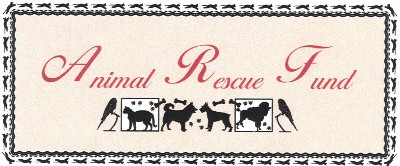
 | ||||
The following questions are answered, to the best of their ability, by either members of the Animal Rescue Fund who are experienced in the care and training of dogs, or by members who are actual professional dog trainers.
It must be remembered that your best advice on health care matters will come from your veterinarian.
WHAT IS THE FIRST THING I SHOULD KNOW BEFORE BEGINNING PUPPY OR DOG TRAINING? - More than anything, you need to establish yourself as the dominant, or "alpha" leader to your dog. As pack animals, dogs rely on an alpha member to lead them, and in the wild this is usually the strongest male (and, by association, his mate), but it can be any member of your household who is responsible for the dog's training and feeding. This is accomplished with a firm, commanding voice and demeaner, always requiring that the dog do what he is expected before receiving his reward, whether the reward be an excited "Good boy (girl)!" or a food treat. Violence, such as hitting your dog, should never be a part of training. Always keep in mind that different personalities of dogs require different amounts of conditioning. A naturally submissive animal will require much less convincing than a highly-active dog who has more dominant characteristics.
IS IT TRUE THAT DALMATIANS ARE NOT GOOD WITH YOUNG CHILDREN? - Actually, just the opposite is true - they are too "good" for young children. As one of the most active dogs (bred to run 30 miles a day), they love to play rough, especially with children, and can unintentionally harm children under 6 years of age.
WHICH ARE CONSIDERED TO BE THE MOST "ACTIVE" DOGS? - Generally, this group would include the Border Collie, the Jack Russell Terrier, the Dalmatian, the Boxer, and the Labrador Retriever. Conversly, the more "laid-back" dogs would include the Golden Retriever and the Bassett Hound.
MY MALE DOG OFTEN MOUNTS OTHER MALE DOGS. IS THIS A SIGN OF SEXUAL DYSFUNCTION? - What you are seeing is a very normal form of expression for a male dog. It is his way of attempting to show that he is dominant over the other dog, who may either resist the mounting attempt, in which case a fight for dominance could occur, or he may accept his lower rank and allow the mounting dog to continue. In cases of equal-ranked dogs, they may take turns trying to mount each other. This activity can be seen even in young puppies who are striving for dominance in the litter.
MY DOG GOES CRAZY AND TEARS UP THE HOUSE EVERY TIME WE LEAVE. WHAT CAN WE DO ABOUT THIS? - Your dog may be suffering from "separation anxiety", where he has a fear of either being alone and/or of your not returning. The solution to this can be different for each animal, but basically involves conditioning the dog to accept the fact that you will, indeed, return, and it is all right for him to be alone for awhile. Some things to try include adopting another dog to keep him company, leaving treats "hidden" around the house for him to find while you are gone, leaving toys such as "Kong" toys with peanut butter smeared on the inside to keep him busy during the first half-hour or so (the time when most destruction takes place) and leaving a "dirty" (worn) piece of your clothing with your scent on it for him to sleep with (preferably something that won't matter if he destroys). Spend a few moments with your dog just before you leave, offering loving but NOT playtime (don't make a big deal out of this time).
If none of this helps, then more serious conditioning will be needed. In this case, leave him in the house, drive away, but return in 5 minutes or so. If he has behaved, praise him with a treat and loving. A few hours later or next day, repeat the procedure, adding 5-10 minutes to your time away. Praise good behavior each time you return. If he has not behaved, offer no praise or playtime, wait a short while, and repeat the last time cycle. Continue this procedure, adding 5-10 minutes to each absence.
A.S.P.C.A. TOLL-FREE HOTLINE OF FAQ - To get answers to questions from the A.S.P.C.A., call their 24-hr. FAQ hotline at 1-888-252-7387. Enter one of the following 3-digit codes for the type of question you have:
HOW DO I GET SKUNK SMELL OFF MY DOG? - Try this tested method. Mix one quart of hydrogen peroxide, 1/4 cup baking soda and 1 teaspoon of liquid hand soap. Immediately after mixing together well, apply to the dog's coat (it will still be foaming). Leave on for 5 minutes, and rinse. The peroxide will not bleach the dog unless the solution is left on for more than 5 minutes.
HOW DO I TRAIN AN AGRESSIVE DOG TO NOT BE AGRESSIVE?
Please visit this site for information on this topic:
FAQ-DOGS
 | ||||